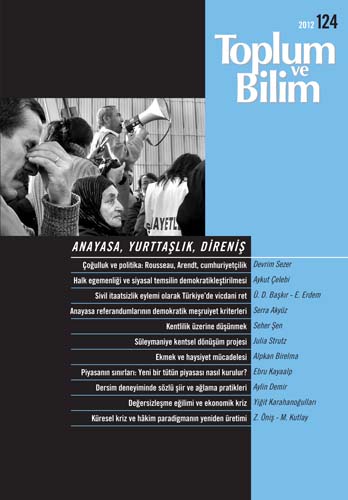Çoğulluk ve politika: Rousseau, Arendt, cumhuriyetçilik
DEVRİM SEZER
Özet: Cumhuriyetçi politika teorisi aralarında gerilimli bir ilişki olan iki perspektifi uzlaştırmasıyla modern bir normatif ufuk kazanır. Bu gerilimli sentezin bir kutbunda halk egemenliği ve etkin yurttaşlık, diğer kutbundaysa anayasacılık yer alır. Cumhuriyetçi düşüncedeki en önemli tartışmalardan biri, bu senteze dayalı bir özyönetim biçiminin sadece kurumsal ve anayasal düzenlemelerle yaşatılamayacağına ilişkin Rousseaucu tezdir. Bu yazının iki temel hedefi var. İlki, Rousseau’nun kamusal tartışma ve muhalefete kuşkuyla yaklaşan cumhuriyetçiliğinin endişelerini ortaya koymak. İkincisiyse, Hannah Arendt’in Devrim Üzerine başlıklı eserinin bizi çoğulluk, tartışma ve çekişme fikrini esas alan başka bir cumhuriyetçilik ihtimali üzerine düşünmeye davet ettiğine dikkat çekmek.
Anahtar sözcükler: Cumhuriyetçilik, çoğulluk, anayasacılık, kamusal özgürlük, etkin yurttaşlık, sivil din
***
Plurality and politics: Rousseau, Arendt, republicanism
DEVRİM SEZER
The political theory of republicanism has acquired its modern normative orientation in its attempt to synthesize two perspectives which have a strained relationship with one another. The poles of this synthesis are people’s sovereignty and active citizenship, on the one hand, and constitutionalism on the other. One of the most important debates within republicanism is the Rousseauian thesis that institutional and constitutional regulations alone cannot guarantee the survival of a rebuplican regime. This article has two main purposes. First, it aims to demonstrate the anxieties of Rousseau’s republicanism which harbours a deep suspicion of public debate and dissent. Second, and interrelated with the first, it calls attention to Hannah Arendt’s On Revolution which offers a different account of republicanism, one that is rooted in the notions of plurality, public debate, and contestation.
Keywords: Republicanism, plurality, constitutionalism, public freedom, active citizenship, civil religion

